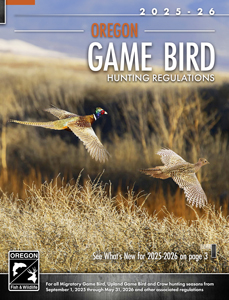Department of Fish & Wildlife

Oregon Department of Fish and Wildlife
Dr. Debbie Colbert, Director
Salem Headquarters Office
4034 Fairview Industrial Dr. SE
Salem, OR 97302
503-947-6000
ODFW in-state toll-free 800-720-6339
Email
Oregon Fish and Wildlife Commission
Mary Wahl (Chair) - Langlois
Dallas Hall DeFrees - Baker City
Becky Hatfield-Hyde - Paisley
Leslie King - Portland
Mark Labhart - Sisters
Bob Spelbrink - Siletz
Full Service Offices
High Desert
61374 Parrell Rd.
Bend, OR 97702
541-388-6363
Northeast
107 20th Street
La Grande, OR 97850
541-963-2138
Northwest
17330 SE Evelyn Street
Clackamas, OR 97015
971-673-6000
Southwest
4192 N Umpqua Hwy
Roseburg, OR 97470
541-440-3353
Website
Oregon Department of Fish & Wildlife
Information and Education
Licensing
Wildlife Division
Wildlife Violations
1-800-452-7888
Or Dial *OSP(*677)
Information can be provided in alternative languages or accessible formats for individuals with disabilities upon request. Please visit the ODFW accessibility page to submit your request.
ODFW prohibits discrimination on the basis of race, color, national origin (including language), age, sex, mental or physical disability or sexual orientation. If you believe you have experienced discrimination in any program, activity, or facility—or if you would like more information—please visit the ODFW accessibility and civil rights page, or contact Deputy Director for Administration, ODFW, 4034 Fairview Industrial Dr. SE, Salem, OR 97302, or call 503-947-6042, or write to the Office of Diversity, Inclusion, and Civil Rights, Department of the Interior, 1849 C Street NW, Washington, DC 20240.

English
Information about ODFW regulations, licenses, and programs is available in alternative languages and accessible formats. For assistance, call 503-947-6042 or visit the ODFW accessibility page. These services are available at no cost to you.
Spanish
Información sobre los programas, licencias, reglamentos y otros materiales de ODFW está disponible en idiomas y formatos alternativos. Llame al 503-947-6042 o visite para obtener ayuda. Estos servicios están disponibles sin costo alguno para usted.
Vietnamese
Thông tin về các quy định, những giấy phép và các chương trình của ODFW có sẵn bằng các ngôn ngữ và định dạng khác nhau. Gọi 503-947-6042 hoặc truy cập https://www.dfw.state.or.us/ag... để được giúp đỡ. Những dịch vụ này được cung cấp cho quý vị mà không có lệ phí nào.
Russian
Информация о правилах, лицензиях и программах ODFW доступна на других языках и в других форматах. Позвоните по телефону 503-947-6042 или посетите https://www.dfw.state.or.us/ag..., чтобы получить помощь. Эти услуги доступны для вас бесплатны.
Ukrainian
Інформація про правила, ліцензії та програми ODFW доступна альтернативними мовами та в інших форматах. Щоб отримати допомогу, зателефонуйте за номером 503-947-6042 або відвідайте сторінку https://www.dfw.state.or.us/ag.... Ці послуги доступні для вас безкоштовно.
Traditional Chinese
有關ODFW法規、許可證和活動的信息可以其他語言和格式提供。請致電 503-947-6042 或到 https://www.dfw.state.or.us/ag... 查詢。您可以免費獲得這些服務。





